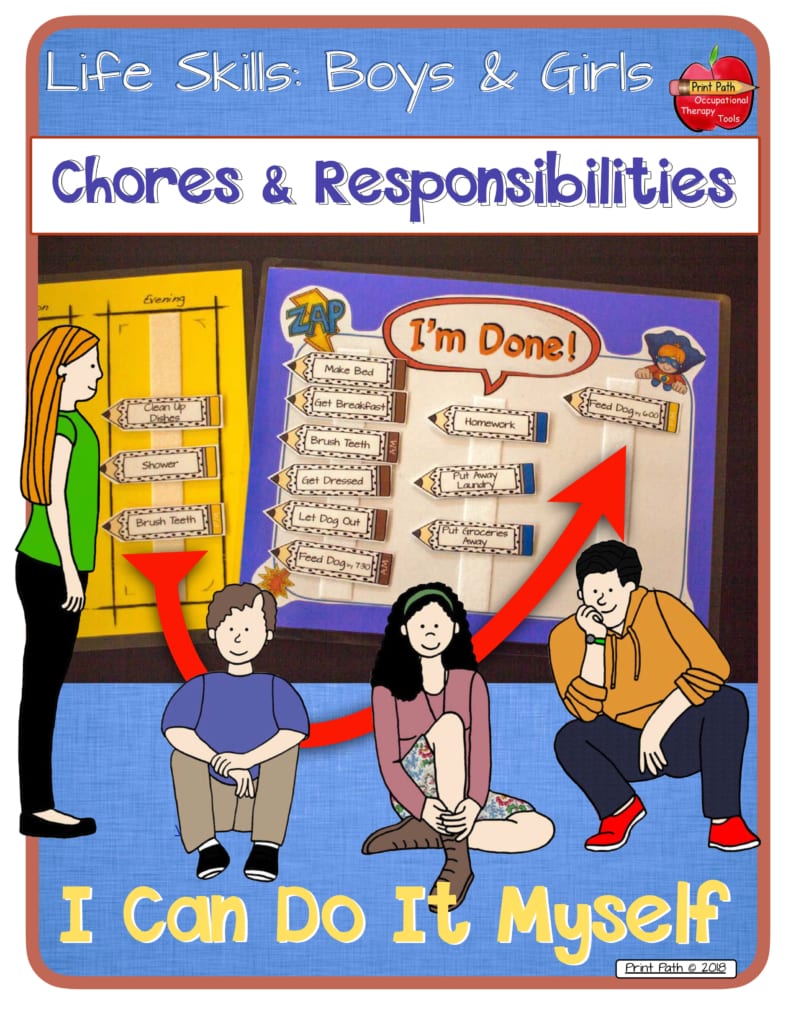Daily Living Skills – Goals and Objectives

Why is important to encourage goals and objectives for daily living skills in our students? Without daily living skills, students are not able to do many things that are considered vital daily tasks for the ultimate goals of independent living.
Some daily living skills include taking care of your school supplies, tidying up your desk, meal planning, cooking for yourself or others, cleaning, taking care of personal hygiene, getting dressed or undressed, shopping for daily needs, planning daily activities (such as hiking), etc.
Daily living skills can be taught and practiced by teachers, parents, family members, friends, etc., but the student must ultimately take responsibility for practicing daily living skills outside of school on their own.
Some daily living skills are considered to be personal daily living skills that the student will use on their own to meet their specific daily needs. Some daily living skills are interpersonal daily living skills that are used in daily interactions with others. Interpersonal daily living skills include communication, social thinking, self-advocacy, friendship building, etc. Personal daily living skills are intended to be used by a single individual – the student themselves using daily living skills to meet their own daily needs. Interpersonal daily Living Skills are intended for shared use between two or more people – the student and one or more other people.
When teaching daily living skills, it is important to keep in mind the goal of independence. The sooner students can learn and be successful with daily living skills, the sooner they will be able to live more independently. Independence can mean different things to different people, but in general, it is defined as having autonomy or control over daily activities. However, daily living skills are not all about independence – daily living skills are also about working together with others to help each other succeed in daily life using daily living skills.

Life Skills: Chores, Routines, and Responsibilities
Daily Living Skills Goals and Objectives List
When writing annual goals for IEP these instrumental activities of daily living can help provide ideas for the IEP team in special education. For older students (ie high school), it is critical that there are many teams members for transition services such as a family member, the student, teachers, related service providers and other support staff. The most important team member is the student and be sure to discuss their personal goals.
The following is a list of daily living skills goals that can be used as a guide when teaching daily living skills.
- The student will be able to independently dress themselves to go outdoors during the school day.
- The student will follow the rules listed in the classroom.
- The student will count money and make correct change.
- The student will wash their hands after using the bathroom and before meals.
- The student will identify safety signs.
- The student will follow directions written on food packaging.
- The student will be independent in weekly meal planning
- .The student will be able to be independent with meal preparation.
- The student will be able to independently cook a meal.
- The student will be able to independently clean their desk and backpack.
- The student will be independent in the shower for personal care.
- The student will be able to identify and appropriately respond to daily needs (such as hunger, thirst, muscle fatigue).
- The student will be able to engage in daily hygiene practices (such as brushing teeth, bathing, etc.).
- The student will be able to plan daily leisure activities.
- The student will use emotional regulation techniques to remain calm in the loud cafeteria.
- The student will be able to independently engage in daily social skills and interactions with others.
- The student will be able to independently access public transportation to and from school.
- The student will independently use visual aids to complete job applications.
- The student will be able to make a phone call.
- The student will be able to write their name and adress to fill out a form.
- The student will demonstrate knowledge of different community activities.
For young adults with developmental disabilities, you may want specific goals for pre-vocational or vocational training.

Life Skills Checklists
Objectives for the Goals – Examples
For each IEP goal there should be objectives. These are considered the smaller steps to reach the overall goal. It is a great way to write an action plan of how the goal will be achieved and when.
Using the goal, the student will be able to independently dress themselves to go outdoors during the school day, the objectives may be:
- by the end of the first quarter, the student will be able to get coat and accessories out of the closet indepdenently before recess 100% of the time.
- by the end of the second quarter, the student will be able to get the coat out of the closet and put it on correctly without zipping it and put on accessories (ie hat and mittens) before recess 80% of the time.
- by the end of the third quarter, the student will be able to get the coat out of the closet and put it on correctly without zipping it and put on accessories (ie hat and mittens) before recess 100% of the time.
- by the end of the fourth quarter, the student will be able to get the coat out of the closet and put it on correctly with zipping it 100% of the time.
Using the goal, the student will be able to write their name and adress to fill out a form, the objectives may be:
- by the end of te first quarter the student can legibly write their name 80% of the time.
- by the end of the second quarter the student can legibly write their name and street 80% of the time without any prompts or assistance.
- by the end of the third quarter, the student can legibly write their name, street, city, state and zip code 80% of the time with occasional verbal prompts.
- by the end of the fourth quarter the student can legibly write their name and address 100% of the time without prompts.

My Information Binder – Life Skills Important Information
Examples – Area of Need for Daily Living Skills
While daily living skills goals and objectives are important, it is also important to be aware of areas of need that may affect daily living skills. For example, a student with autism may have difficulty with daily living skills due to impaired communication or social interaction. A student who experiences anxiety may have difficulty with daily living skills due to feelings of panic or fear. A student who experiences depression may have difficulty daily living skills due to lack of motivation or sadness.
It is important for daily living skills goals and interventions to be individualized according to the needs of each student. It is equally important, however, that daily living skills goals are realistic given the needs of the student. Being aware of areas of need can help daily living skills goals be tailored to address the specific needs of each student.
When you list an area of need on a student’s IEP, be sure to list a goal that has a direct relationship with that need.

Life Skills of the Month
Examples – Areas of Strengths for Daily Living Skills
When teaching daily living skills, it is important to look at areas of strengths too. Areas of strength can be used for daily living skills goals and daily living skills interventions. For example, a student with autism may have difficulty with daily living skills due to impaired communication or social interaction; however, they also may have excellent visual memory that can be used for daily living skills goals and interventions.
A student who experiences anxiety may have difficulty with daily living skills due to feelings of panic or fear; however, they may be able to stay calm under pressure, which can be used as an area of strength for daily living skills goals and interventions.
A student who experiences depression may have difficulty daily living skills due to lack of motivation or sadness; however, they may be able to use their creativity and problem-solving skills as daily living skills goals and daily living skills interventions.
Examples of Situations for Daily Living Skills
When developing daily living skills goals and daily living skill interventions it is important to think about what daily life will look like for the student. For example, a student who has difficulty dressing themselves may need assistance with putting on clothes, but may be able to independently fold clothes. A student who has difficulty with meal preparation may need assistance in chopping vegetables, but be able to cook a simple meal on their own.
It is important to think about the daily tasks that the student will need to complete in order to live independently. This will help daily living skills goals and daily living skill interventions be tailored specifically to the needs of the student.
Daily living skills goals and objectives are important for students to achieve independence in their daily lives. By setting realistic goals and objectives, teachers and therapists can help students work towards independence in daily living skills. Areas of need and areas of strength should be considered when setting daily living skills goals and objectives. Additionally, it is important to think about what daily life will look like for the student and develop goals and objectives that reflect the student’s needs.
How Can Occupational Therapists Help Set Goals?
Occupational therapists are experts in daily living skills who can help set daily living goals, individualized daily living skills teaching, and guide daily living skill interventions. They are part of related services listed on the child’s IEP. Occupational therapists are trained to teach daily living skills to students with special needs using methods that are engaging for the student.
Occupational therapists also have knowledge of student resources (such as other professionals who can help, technology aids, etc.) that can be used to support daily living skills goals.
This list is not exhaustive, and daily living skills goals and objectives should be tailored to the individual needs of the student. If you are an educator who is working with a student who needs daily living skills intervention, it is important to consult with an occupational therapist to help set appropriate daily living skills goals and objectives.

Life Skills Writing Prompts
Read More About Daily Living Activities and Life Skills
Teaching Life Skills with Videoconferencing
Important Information Children Should Know


